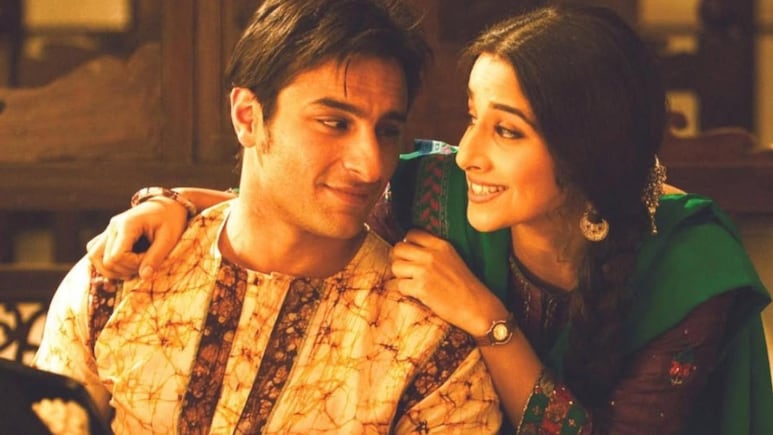
Two decades ago, when Parineeta released in 2005, many of us were still playing with Beyblades, watching Shinchan, or just discovering Orkut. Fast-forward to 2025, and suddenly we're sitting in multiplexes with iced lattes and a bucket of popcorn, watching Vidya Balan's debut film re-release on the big screen.
The nostalgia is real. But here's the question: can a 2005 melodramatic musical adaptation of a 1914 Bengali novella hold the attention of a generation raised on Netflix, memes and instant swipes? The answer is complicated, much like Shekhar's mood swings in the film.
A Visual Masterclass
Let's give credit where it's due: Parineeta is stunning. The sepia-tinted frames of 1960s Kolkata, the cabaret-style Moulin Rouge sequence with Rekha, the delicate swing shot of Lolita (Vidya Balan) set against Tagore's music, each frame feels like a painting. If you have the patience to soak it in, the film is a visual masterclass.
For Gen Z, used to snappy edits and reels-ready cinematography, this pacing might feel "grandpa-core." But maybe that's the charm, it forces you to sit still, breathe, and actually feel.
Was Lolita A Feminist Heroine Or A Trapped Ideal?
Vidya Balan's debut as Lolita remains the film's shining star. She's compassionate, dignified, and carries the weight of both her family's survival and her own heartbreak.
For a Gen Z lens, Lolita represents the "good girl" archetype: resilient, sacrificial, and almost too perfect. Her strength is subtle; she doesn't scream feminism, but she embodies it by refusing to bow entirely to societal pressures.
But here's where things get messy. The title itself, Parineeta, meaning "the married woman", frames Lolita's identity in terms of marriage. That's a red flag for a generation that questions why women's worth is still tied to marital status. We find it frustrating that despite her intelligence and emotional depth, Lolita's future is largely dictated by her husband, Shekhar (Saif Ali Khan)'s temper tantrums and her uncle's financial decisions.
Shekhar Roy, A Walking Red Flag (Quite Literally)
Let's talk about Shekhar (Saif Ali Khan), the aristocratic heir torn between love and ego. If Shekhar existed in 2025, he'd be the guy who ghosts you after three months, only to come back with a "Hey, was thinking about you..." text. His jealousy, indecisiveness, and reliance on his father's approval make him painfully regressive by today's standards.
And then there's the infamous climax, where Shekhar literally breaks down a brick wall to claim Lolita, egged on by a chanting crowd shouting "Tod do! Tod do!" In 2005, it was high drama. In 2025, it's borderline cringe. A Gen Z audience might mutter, "Go to therapy instead of breaking architecture."
The Patriarchal Punch
The film doesn't shy away from showcasing patriarchy in its ugliest forms. Shekhar's father (Sabyasachi Chakraborty) casually refers to Lolita as a "whore," and in one shocking moment, calls his own son a napunsak (eunuch). That one word is designed to sting, but from a 2025 perspective, it's also deeply problematic, both misogynistic and transphobic. It's cruel, and it casually dehumanises an entire community. Gen Z, raised in an era of inclusivity and gender sensitivity, would find this casual cruelty hard to digest.
At the same time, it's worth noting: Parineeta doesn't glamorise these moments. It exposes them as part of the toxic environment that Lolita and Shekhar are trapped in. So while uncomfortable, they are crucial in understanding how oppressive patriarchy was, and often still is.
Sanjay Dutt, The "Other Man"
Sanjay Dutt plays Girish, Lolita's older benefactor, with restraint. He's self-aware, mature, and almost a counterpoint to Shekhar's boyish immaturity. But let's be real, Gen Z isn't exactly buying into the idea of a significantly older man swooping in to "save" a younger woman. While Girish is not predatory, his role still feels like another iteration of men controlling Lolita's destiny. It's less creepy than it could have been, but it still feels like Lolita is constantly being passed between male guardians.
The Music Still Slaps
Here's where Parineeta scores with Gen Z. The soundtrack, composed by Shantanu Moitra, is still fresh. Piyu Bole feels like a warm hug, Kaisi Paheli Zindagani is jazzy enough to feature on a lo-fi playlist, and Soona Man Ka Aangan remains heartbreak in musical form. Unlike the plot, the music hasn't aged, it's evergreen. You could easily imagine these songs trending on Instagram reels as aesthetic audios.
Was Parineeta Ahead of Its Time Or Stuck In The Past?
Honestly, it's both. On one hand, the film celebrates literature, vintage cinema and female-centred narratives. On the other, it glorifies melodramatic masculinity and ties a woman's identity to marriage. It captures the tension between tradition and modernity, a theme that we can relate to, especially in an India still negotiating between old-school conservatism and progressive ideals.
The Final Verdict
Watching Parineeta in 2025 is like flipping through your family's old wedding album: beautiful, poignant, but also filled with moments that make you wince. On one level, it is a cinematic gem. Vidya Balan's debut remains unforgettable, the music hasn't aged a bit, and the cinematography is still breathtaking.
On another, it is weighed down by Shekhar's toxicity, the casual misogyny and patriarchal slurs, and a climax that feels more exaggerated than emotional. The film's insistence on framing Lolita's identity around marriage may frustrate a Gen Z audience, but its raw honesty about the shackles of class, patriarchy, and love gives it relevance even today.
From a Gen Z lens, Parineeta is both a cinematic gem and a problematic fave. It hasn't aged perfectly, but it still has a beating heart that forces you to reckon with how far we've come and how much further we still need to go.

